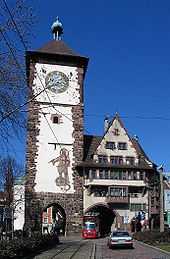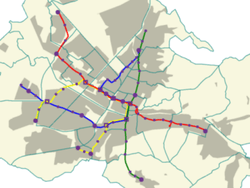Freiburger Verkehrs AG

Company
Freiburger Verkehrs AG, also known as VAG Freiburg or just VAG, is the municipal transport company of the city of Freiburg im Breisgau in Germany. It is a member of the Regio-Verkehrsverbund Freiburg (RVF), a transport association that co-ordinates public transport in the city of Freiburg and the neighboring districts of Emmendingen and Breisgau-Hochschwarzwald.[1]
Furthermore VAG owns 50% of the shares in the Breisgau S-Bahn, the other 50% are with SWEG. The company operates a regional railway network on DB Netz AG and SWEG owned tracks. The services run on short sections of the Magistrale Upper Rhine Valley Railway, together with the Elztalbahn, Kaiserstuhlbahn and Breisachbahn branch lines.[2]
The VAG is a public limited company. Shareholder is the city of Freiburg. In 2010 the overall loss was 7.545 million €. This was accomplished by a cover ratio of 88%, which is impressingly high by German public transport standards.
History
The company was founded as Direktion des Elektrizitätswerkes und der Straßenbahn on October, 1st 1899.
The basic tram net with four lines went to service in 1901. They were converted former horse bus lines.
The Schauinslandbahn went to service in 1930 by a privately owned company and after being bought by the city of Freiburg in 1968 merged to the VAG in 1982.
The Breisgau-S-Bahn was founded in 1995. Because of the previous existing services the operating started immediately.
Network

VAG operates a network comprising tram lines, bus routes, and a gondola lift. The network carries an average of 200,000 passengers a day. The backbone of the network is based on four tram lines. Coordinated with these are 26 bus lines connecting interchange points to surrounding areas. In addition, the Schauinslandbahn provides access to the summit of Schauinsland mountain.[3][4]
VAG operates its lines by a fleet of 62 trams and 104 buses. These cover 3.1 and 4.1 million kilometres a year respectively.[4][5]
Most trams and all busses offer low floor service.
Regular tram intervals are five minutes (line 1) and 7.5 minutes (lines 2,3 and 5) and the bus service intervalls depend severely on the line and vary mostly between 10 minutes and 60 minutes.
An extension of tram line 2 (green) of 1.9 km to the north is under construction and scheduled to start service in 2014
The increasing service quality and quantity increased the number of passengers from 46 million in 1990 to 73 million in 2010. This 58% increase is remarkable whilst the population of the city increased by 23%.
-

tram type GT8N at Stühling bridge near central station
-

tram type GT8Z at stop Lorettostraße
-
tram type Combino Advanced at former stop Bertoldsbrunnen
-

bus (#831) in Hochdorf
Bibliography
- Deacon, Ray (1998). Freiburg: From classic tramway to light rail. Light Rail Transit Association. ISBN 0-948106-22-0.
- Annual report 2010 (German)
References
- ↑ Deacon, Ray (1998). p. 2. Missing or empty
|title=(help) - ↑ Eisenbahnatlas Deutschland. Verlag Schweers + Wall GmbH. 2009. pp. 102, 110. ISBN 978-3-89494-139-0.
- ↑ Deacon, Ray (1998). p. 17. Missing or empty
|title=(help) - ↑ 4.0 4.1 "About the VAG". Freiburger Verkehrs AG. Retrieved 2009-04-17.
- ↑ "Der Wagenpark" (in German). Freiburger Verkehrs AG. Retrieved 2009-04-17.
External links
| Wikimedia Commons has media related to Trams in Freiburg. |
| Wikimedia Commons has media related to Buses in Freiburg. |
